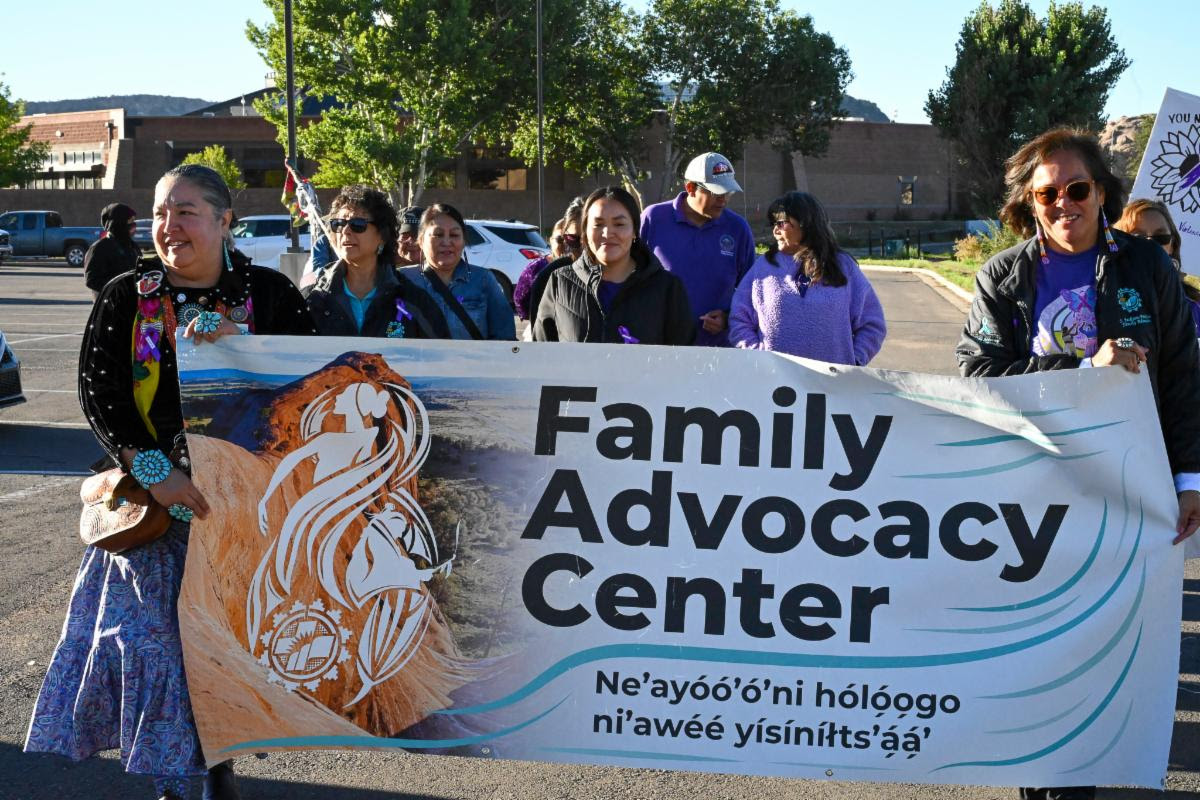
- Details
- By Native News Online Staff
In a united show of solidarity and advocacy, members of the 25th Navajo Nation Council joined families, survivors, and community leaders for a walk organized by the Missing and Murdered Diné Relatives (MMDR) Task Force in recognition of Domestic Violence Awareness Month.
Council Delegates Amber Kanazbah Crotty, Shaandiin Parrish, and Helena Nez Begay walked alongside advocates and supporters, emphasizing the urgent need for justice, survivor-centered resources, and legislative reform to combat domestic violence across the Navajo Nation.
“This walk is more than a moment, it’s a movement built on the strength and resilience of our people,” said Delegate Amber Kanazbah Crotty, Chairwoman of the MMDR Task Force. “We are committed to changing how domestic violence is addressed on the Navajo Nation. Through our efforts to amend Title 17 of the Navajo Nation criminal code, we will push for justice that protects our families, especially our children. This is about legal reform; it’s about standing up for our relatives and ensuring their voices lead the way.”
The event drew participation from a range of organizations committed to victim support and advocacy, including Northern Arizona Victim Witness Services (NAVWS), the MMDR Coalition, Utah Navajo Health System, Northern TREE House Shelter, and Fort Defiance Indian Health Services – Family Advocacy Center. These groups shared information and services with attendees, underscoring the critical role of community-based responses to violence.
Laurelle Sheppard of NAVWS detailed the services her organization provided over the past year, including shelter, translation, transportation, and 24/7 crisis support. These resources, she said, are essential lifelines that incorporate both trauma-informed and traditional healing practices.
Vangie Shorty of the MMDR Coalition joined others in drawing attention to the deepening intersection between domestic violence and the crisis of missing and murdered Indigenous women. Advocates called for stronger policies, long-term funding commitments, and unified community action to end cycles of violence.
Speakers also highlighted the lasting impact domestic violence has on children and vulnerable adults. Many urged revisions to the Navajo Nation’s Vulnerable Adult Protection Act, along with expanded access to safe housing and culturally appropriate services.
The 25th Navajo Nation Council reaffirmed its commitment to advancing survivor protections and supporting legislative efforts led by the MMDR Task Force. Proposed amendments to Title 17 of the Navajo Nation criminal code are part of a broader initiative to address systemic gaps, assert tribal sovereignty, and ensure safety and justice for all Diné people.
More Stories Like This
Native News Weekly (August 25, 2024): D.C. BriefsUS Presidents in Their Own Words Concerning American Indians
South Dakota Hotel Owner Found Liable for Discriminating Against Native Americans
Monday Morning (December 22, 2025): Articles You May Have Missed This Past Weekend
Read What Our Year-End Campaign Donors Are Saying
Help us defend tribal sovereignty.
At Native News Online, our mission is rooted in telling the stories that strengthen sovereignty and uplift Indigenous voices — not just at year’s end, but every single day.
Because of your generosity last year, we were able to keep our reporters on the ground in tribal communities, at national gatherings and in the halls of Congress — covering the issues that matter most to Indian Country: sovereignty, culture, education, health and economic opportunity.
That support sustained us through a tough year in 2025. Now, as we look to the year ahead, we need your help right now to ensure warrior journalism remains strong — reporting that defends tribal sovereignty, amplifies Native truth, and holds power accountable.
 The stakes couldn't be higher. Your support keeps Native voices heard, Native stories told and Native sovereignty defended.
The stakes couldn't be higher. Your support keeps Native voices heard, Native stories told and Native sovereignty defended.
Stand with Warrior Journalism today.
Levi Rickert (Potawatomi), Editor & Publisher


